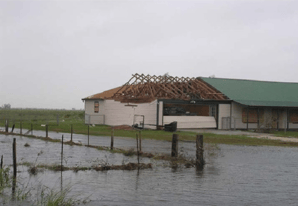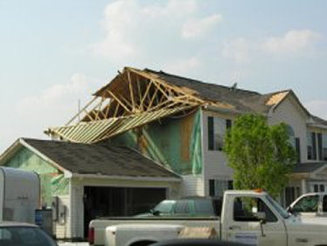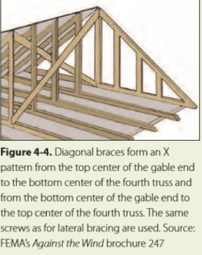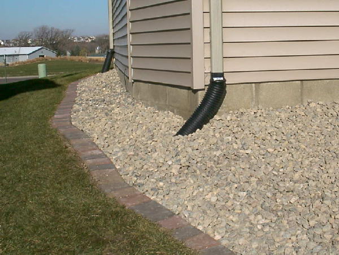There are three primary ways hurricanes do damage. First, is wind damage. Just the sheer force of 75 mile an hour winds or above sustained for several hours can do major damage. Second, is the residual effect of wind, flying debris and downed trees. Finally, flooding can be a major concern, not just in flood prone areas but even in low areas near your home. In preparing for potential hurricanes it is very important to step back and evaluate your entire property and identify which areas need attention. Let’s consider these three areas in relationship to your property.

Picture your home in a flooding stream of water. As long as your home stands the water will swirl around it. Wind and water take the path of least resistance. Strong winds in a hurricane will act just like water. Therefore, it is imperative the envelope, or exterior of your home remains intact. The weakest points are your garage door, gable ends, entry doors and windows. A very common sight after a major hurricane is like the picture here. What happens is the garage door fails, the hurricane force wind is now inside the garage with no way out and often it will lift the roof from the garage area only. Notice in the picture the remainder of the roof is intact. Garage doors are tested and rated for certain wind speeds specified by your local building code. What most don’t know is the test criteria is to withstand the wind pressure and speed for 10 seconds. It is estimated 80% of hurricane damage to homes is due to garage door failure. Have a professional check your door and add support if necessary.

The other major area of weakness in a home is the gable ends. Many homes in Florida have hip roofs because theyare stronger in high wind situations. See the picture to learn the difference in roof types. If you have the gable type roof, make sure it is adequately braced in the attic.

If the gable end fails it also will allow the wind to lift the roof because of the large amount of pressure bursting in the opening. See the picture of a gable end failure which caused the roof to fail.
FEMA has a brochure that shows a simple method to support the gable ends of your home.
Entry doors should be locked and dead bolted during the storm.

Windows can be covered with any one of several type hurricane shutters. Windows are not prone to break by wind force alone but usually by flying debris.
Always evaluate your entire property and greatest risks before spending large sums of money on any one item. I know a gentleman who spent $6,000.00 on window shutters in 2004. His windows survived the storm nicely but a large tree fell directly on his home. The money would have been better spent trimming trees!
Evaluate all trees on your property. Most counties have an arborist on staff, who may be willing to advise you on what action to take whether trimming or removal. The more branches and leaves on a tree the greater wind pressure will be against it. Trimming can minimize that wind pressure. During the season large Palm Trees are often given a hurricane trim. This removes many of the large, low hanging branches which can demolish your shingles if near your home. The picture shows what the hurricane cut looks like.
 Finally, guard your home against flooding. I’m not talking here about tidal surge and ocean front property. This is protecting your home against excess water that often accompanies a hurricane. The key is to have the natural flow of water away from your home. The picture is one of the best jobs I’ve seen. The keys are, the slope and draining the water away from the foundation of your home. Many Florida homes have no gutter or downspouts, allowing the water to run off the roof and collect at the foundation walls. Over time erosion can cause the water to collect there. This can be a big problem in large rainfall situations. Consult a landscaping professional for help moving that water away from the home.
Finally, guard your home against flooding. I’m not talking here about tidal surge and ocean front property. This is protecting your home against excess water that often accompanies a hurricane. The key is to have the natural flow of water away from your home. The picture is one of the best jobs I’ve seen. The keys are, the slope and draining the water away from the foundation of your home. Many Florida homes have no gutter or downspouts, allowing the water to run off the roof and collect at the foundation walls. Over time erosion can cause the water to collect there. This can be a big problem in large rainfall situations. Consult a landscaping professional for help moving that water away from the home.

The energy experts at Florida Public Utilities hope each of you will be safe and
your homes protected during this hurricane season. For any questions on this article or any energy question contact your energy
experts at www.fpuc.com/energyexperts

